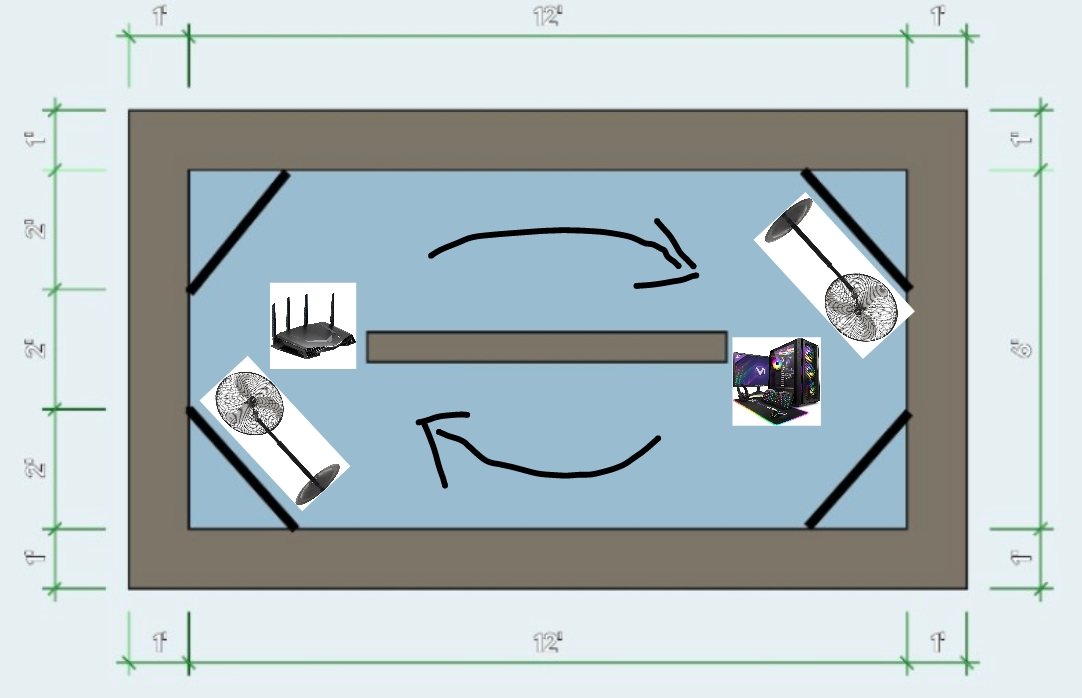yes but pages will render kinda wavy i use a box fan myself for maximum speed
Yes, but then it’s slower for your computer to talk back to your Wi-Fi, so it ends up cancelling out
Push-Pull Config

We can streamline this by making the room into 2 small tunnels from the router to the PC. This way there will be less obstacles in the room. But we need to add leafblowers on each side with a boost button.
What if we make the tubes really really small and wrap them in many protective layers to prevent other wind sources from messing with the signal.
At that point why even bother with the air at all, we could just send electrical signals. Or even light.
Pretty sure that’s the joke, buddy
I know pal i was continuing it on.
Who are you calling pal, friend?
Oh boy, he said pal, I think you are in trouble, mister.
you could also hook into the router and wireless card of the computer to make each of them turn on the corresponding leaf blower whenever they’re sending something. of course you’d probably have to implement some kind of queuing system so only one blower is active at a time, but it will all be worth it for the speed gains
Full duplex airflow signal enhancement
RoRo stations. Roll on, roll off/out. The internet isn’t a highway, it’s a series of bullet trains in tube tunnels.
I wonder if anyone thinks OpenTTD would be more fun with a cyberspace theme? I know there’s a neon grid grf (mod)…
Anyway, if this was a suitable solution for WiFi, we wouldn’t need wired connections. That said, you can cut open a drink can to turn a WiFi router’s signal into a focused beam using the aluminum, iirc.
Interestingly, this could be true and you could never find out experimentally iirc.
I watched a veritasium video about the 1 way speed of light vs 2 way that talked about it.
I watched the same video!
I was right about to disagree and type “wait this only applies to light” but then I remembered: radio is light.
Crazy to think about that!
It is nuts. It goes to show how far science goes proving things through deductions rather than direct observation. So much science is done that way.
I think that there would be some infinite energy glitches if it was actually true that light was faster 1 direction than another, so I think the assumption is a good one. But still fun facts
LOL! Yes, one has to consider this. ZOMG your’s is the best comment!
Le reddit moment tips cap to you sir
deleted by creator
Beat me to it
There are some stupid questions.
Tbf, it’s not like physics stuff is always obvious, especially when dealing with relativity or quantum mechanics. It just feels obvious if you’ve already learned about the research that’s already been done.
It isn’t even remotely intuitive that light should have a max speed that can’t be added to by moving its source relative to other things. Plus, light does interact with matter, but it can only be slowed down by it.
So less a stupid question and more just one that isn’t educated about something.
Yeah yeah, I know. I was mostly just kidding. Everything is magic if you’re ignorant and we shouldn’t shit on people for not knowing something and props to them for asking and seeking knowledge and all that.
But it’s really sad that very basic science like radio waves which are introduced in 5th or 6th grade could be so completely misunderstood.
I remember my 6th grade science class having a lively 15 minute discussion about whether or not rockets can work in space since there’s no air…. We’re looking at videos of rockets working in space and then debating whether or not they do. 🙄
I remember my 6th grade science class having a lively 15 minute discussion about whether or not rockets can work in space since there’s no air…. We’re looking at videos of rockets working in space and then debating whether or not they do. 🙄
This feels a tad different than the person in the screenshot. Screenshot person fundamentally misunderstood how radio waves worked. Meanwhile, 6th grade you absolutely understood how rockets worked, at least to the level of understanding that they need air to work. Because you were right the whole time, those kinds of rockets can’t work in space without air. The slightly absurd solution that you wouldn’t readily know without a deeper understanding of how the rocket is built is that a rocket literally brings its own air with it!
Yeah- you make good points. I think what I was upset about was that we started with a given (they obviously work in space) and then half the class argued they didn’t for a while.
A better question would have been “how can they work since space has no air in space?” which leads to great q & a I think.
Not everyone went to the same school, and not everyone went to school, for any number of reasons. I first attended a health class in college.
Quantum physics is not logical, every other field of physics is! Shame that instead of logic we are taught fucking equations, as if we could look up logical conclusions like equations…
Even less intuitively, the fan would increase the air pressure between the router and receiver, slowing light down slightly. So it would end up (imperceptibly) slowing the signal down.
Yeah, what if I’m moving my router at the speed of light, not so intuitive now
On the contrary, given the premise its a smart observation from an unknownledged person.
“Wifi is waves in the air” is very very wrong but as it appears it’s what this person was thought to believe. Given that they trust this information the conclusion makes perfect sense.
The only “dumb” here is whoever explain wifi like this to them.
So what the post really amounts to is. “I applied actual reasoning to the information i was provided as fact and my conclusion seemed strange, so i will ask on no stupid questions to figure out whats really going on”
More intelligent than the majority of internet users.
“I don’t know, can anyone help me learn?” gets so much respect from me. Incredibly powerful mindset.
it obv goes through the ether
This is not stupid at all. If Wi-Fi used matter instead of magnetic fields to propagate (like sound waves), a fan would affect it. Understanding magnetic fields is anything but intuitive.
Agreed, it’s just someone trying to learn.
Alternatively I would guess if fans improved the speed we’d have wifi fans throughout the house. Gaming wifi fans that sound like an airplane taking off with blinding LEDs
Imagine…
Not at all in this case though! Or rather, it depends on your perspective.
“Why doesn’t electricity leak out the outlet?” is a good question, if you know nothing about electricity.
“Why doesn’t electricity leak out the outlet?” is a little stupid, if you know a little about electricity.
“Why doesn’t electricity leak out the outlet?” is a great question if you know a bit more about electricity (because it does leak out, it’s just that 50/60Hz doesn’t couple to freespace well unless you have a colossal antenna).
As to this question, light in moving media: https://preprints.opticaopen.org/articles/preprint/Fizeau_Experiment_Investigating_the_Speed_of_Light_in_Moving_Media/25441108?file=45147313
I mean technically the weather influences your ping, since the waves travel slower at higher air pressure
Edit: Accidentally got it the wrong way around
I’m not sure if you’re being sarcastic but this is not true. Electromagnetic waves travel fastest in a vacuum, so the presence of air would slow it down very slightly and I would expect higher air pressure would slow it down further again only incredibly slightly because the electromagnetic waves would be traveling through a medium less efficient and more different than a vacuum.
Of course I’m making an assumption that you were using wireless signals. For all I know, you could have some weird acoustic link in which case you’d be absolutely right.
Internet via carrier pigeon. A strong headwind will reduce your effective transmission time.
I believe this mode of communication was actually standardized.
They would travel slower at high pressure and high temperature due to more interactions. Low temp and low pressure are the opposite. Sound is faster with high pressure and more complicated on temperature.
Oh, wow. You really triggered them this time.
Esp those pushed to devices with the form factor of a remote control, running the official reddit app
Yeah, but it evens out since now your messages going back to the router have to swim upstream.
Could this be remedied by sending packets on a second antenna, with a fan blowing in the opposite direction?
Only if the two air streams don’t intersect, otherwise you’ll create a dead zone. Modern signal jammers are actually highly sophisticated fans.
You must never cross the streams
Yes, but the tailwind becomes a headwind on the way back to the router so you won’t see any actual speed changes. Putting a fan on both ends will cancel each other out too.
You need to change all the gaseous air out for either liquid or a solid as waves propagate faster through them. You should start with filling your house with liquid oxygen as a nice half step so you still have something to breathe easily, as solids are a bit more tricky.
The general idea is correct, but since we’re dealing with electronagnetic waves, they travel slower in any medium. So pumping out all the air of the room would technically make your wifi faster.
Liquid oxygen has (I think) a refractive index of about 1.2, so it would make the signals 20% slower (still very fast)
NERD
Dude waited 11 months of lurking and not posting or commenting anything, and breaks their silence with that attractive string of knowledge. I’ve got mad respect for them.
I’m a nerd too but come on, he’s replying to an obvious joke with high school physics. There are more layers, do you want a more pedantic teardown?
- Most likely, the “Wi-Fi speed” the Reddit poster needs to improve is the data rate, not latency.
- The data rate can be improved significantly by increasing RSSI with a better physical setup, WDS, higher power etc. However, if the rate is too low at full bars, the bottleneck is the ISP plan or hardware specs.
- The latency cannot really be improved without changing hardware or software, as the highest impact one can influence is in processing by the router and device. Some settings such as DNS cache size can improve latency in some cases with some downsides.
Meh, we all have our personalities. A lot of people hate my personality, but I just figure it’s best to assume everyone on the internet is a stranger that could be a potential friend. If they answer things blunt or love to extrapolate with excruciating detail… Who am I to judge. I just make jokes and hope they don’t accidentally make someone feel bad. Like I really wanted to reply to yours saying that you were just trying to show off and get me to call your words attractive as well ; ) haha.
What if i put the router in front of an open window, open the window behind my computer and put a fan between the two ?
No, the fan will blow the packets all over the place, which is fine for UDP, but any TCP/IP connection will suffer. Place the fan in front of the router so that the blades will catch any dropped packets and throw them back into the datastream.
uh, hi. If you place the blades in front of the router, it will start chopping the packets before they even reach. You need to use an bladeless fan
Alright so I’ve now got a router using cell signal hardwired into a Roomba randomly roaming the halls so everyone gets shitty connections all the time.
No need, that’s why we have the Don’t Fragment bit in the IP header
Just gotta adjust the MTU and fan RPM
that sweet spot
Everyone know that.
Not inherently stupid question; they just don’t know that radio waves don’t travel through air but through space.
But air is empty space?! /s
they just don’t know that radio waves don’t travel through air but through space
does this mean radio waves can go to mars? if so, why don’t we ride them to mars?
You’d need a very small saddle.
It’s not much of a stupid question even given that - for a refractive medium, speed of light can change with its movement. Though for air it’ll be extremely hard to directly notice; it has n≈1.0003 so speed of light in air is already 0.9997c, and increasing it to, say, 0.9998c would require moving the air at 0.166c.
Stupid laws of nature, making everything cool super hard and expensive!
What is space exactly?
Depends on the direction the fan is facing. If it’s blowing towards you, that increases air pressure in front of it, which means more things for photons to interact with and a lower speed of light, thus slower wifi. Away from you would decrease the pressure and result in faster wifi due to the increased speed of light. Theoretically at least. I don’t think this effect is measurable.
Edit: thinking about it, the electromagnetic noise from a fan motor would likely be worse than the benefit. You might even be able to detect that
Yes, but only in one direction and if you use UDP instead of TCP. Also your MTU needs to be small enough for the packages to fit between the blades of the fan, otherwise that causes package fragmentation.
/s
Sort of a serious answer because I’m bored: You’re thinking of speeding up the air when what you should be thinking about is speeding up the waves. But then your waves are reaching you plenty fast already with latency being in the single digit ms range. Not much of a point in trying to accelerate that, really. You won’t notice anyway.
If you feel like your internet connection via Wi-Fi is slow then the bottleneck is probably not with the Wi-Fi part of your network but the Internet Access Point behind it. Or even further down the line.
Now this is based on the assumption that you are in a fairly typical network environment, i.e. using semi-current hardware with moderate, if any, electromagnetic interference in the area. If you’re living right next to a high voltage transformer station and using a router from 2008 then, yes, you’re going to have Wi-Fi performance issues.
But in most cases, people complaining about “slow Wi-Fi” are actually suffering from Internet connectivity issues.
Think of it this way: If you enjoy your McDonald’s from the local franchise but you can only get 100 burgers per hour from them (of course you need MOAR!) then upgrading your 320hp Camaro to a 400hp Mustang is not going to enable you to pick up appreciably more burgers from the drive through in the same amount of time.
Not entirely true.
In an apartment in the middle of a city, noisy neighbours can be a problem.In those cases, it’s best to jump to 5 GHz, and leave the 2.4 band alone.
Except if you have an ECOVACS cleaning robot which refuses to work with modern 5GHz networks. I actually had to install a Wi-Fi bridge to get around that limitation; thankfully, I still had one lying around. Helped me get a better signal for my phone in the bathroom as well.
But thank you for adding this information. Congestion due to interference from other networks (I guess that’s what you meant) can definitely be a factor as well. I guess that’s the problem with the notion of “normal” that I employed rather carelessly.
Sidenote: the fact that your Wi-Fi still works in those conditions at all instead of shutting down goes back to pioneering research done by actress-cum-scientist Hedy Lamarr during WW2. Amazing woman.
which refuses to work with modern 5GHz networks.
Companies that make IoT devices do this so they can save a bit of money. It lets them use lower end, cheaper wifi chips (or left over older-generation chips that they can buy at a discount). I’m not really a hardware person but apparently 2.4Ghz wifi radios are a lot simpler than 5Ghz ones. Apparently they’re also $2-$3 cheaper which adds up when you’re producing a lot of units.
Also, the 5Ghz band differs per country. For example, some channels are authorized in the USA but not in Europe. Some companies stick to 2.4Ghz to avoid having to make anything region-specific.
There are plenty of things in a normal home that can cause serious signal attenuation (just installed new energy efficient windows? whoops! those IR blocking coatings severely attenuate microwave signals too). Poor AP placement is a very common cause of “slow wifi” and has nothing to do with your internet uplink.
Again, you point out why “normal” is an iffy notion to begin with. Thank you for elaborating instead of just downvoting. 🙂
Failing to fully utilize the existing antenna diversity options on modern routers/APs might be another common cause that comes to mind.
If you had a fan blowing out the window, it could slightly reduce the density of the air in your house, leading to a tiny increase in the speed of light through it, so that would make the waves technically faster, but by a vanishingly small margin
It wouldn’t increase the bitrate of your router at all, so it wouldn’t make a difference, but the waves would be faster
Bitrate wouldn’t change, but it would reduce latency by a tiny amount.
With less matter for the photons to interact with, I assume the WiFi’s SNR would be improved. If fewer data frames need to be retransmitted at the link layer (WiFi), I figure the apparent bitrate at the IP level might actually be improved!
Actually, I would not be shocked if WiFi itself adapts to conditions, e.g. by sending less data per frame with more error correction bits when SNR is already low.
(Not a networking expert, I am just bullshitting.)
I like this question tbh
The Wifi isn’t waves made of air, the wifi is waves of the electromagnetic spectrum, similar to visible light, and they travel faster than you can perceive.
So no.
But you can do something similar with a microwave oven. It’s just that any signal making it through the radiation of the oven would be disfigured and useless.
I mean, that was my first thought… but would there be a measurable difference?
I mean lets be clear, with a fan you’re adding like 8 mph to something going 299,792,458 meters per second. You won’t notice anything.
But like, vacuum vs glass vs glass moving half the speed of light, could be an interesting what if. Relativity is always where my mind glosses over in physics.
Unless the air particles make real contact with the photons then you’re not adding anything to anything, and the ones that do will be deflected.
Imagine a rock in space coming close to hitting a planet, or even entering a solar system at all. Similar scale.
I think it’s important to point out as well that there is a mesiarble difference between between the permittivity of free space and air. But to your point the difference is quite small: e_r air is 1.0006 whereas e_r freespace is 1.
While temperature and pressure do have an effect on e_r air I don’t know enough to say that net movement of the particles in one direction would have a measurable effect.
My instinct is no.Looks like lukewarm_ozone proved me wrong. https://lemmy.today/comment/13053868
Yes but you have to put a slit in front of it so the wifi waves turn into wifi particles.
Gotta get me one of those oscillating routers.
They do kind of oscillate, just very very quickly.









